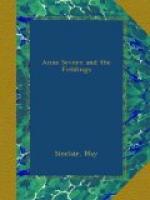“If you’re going into Wyck, Jerry, you might tell Yearp——”
Yearp.
He got up. His face was very red. He looked mournful and frightened too. Yes, frightened.
“I—can’t, Mother.”
“You can perfectly well. Tell Yearp to come and look at Pussy’s ears, I think she’s got canker.”
“She hasn’t,” said Jerry defiantly.
“She jolly well has,” said Eliot.
“Rot.”
“You only say that because you don’t like to think she’s got it.”
“Eliot can go himself. He’s fond of Yearp.”
“You’ll do as you’re told, Jerry. It’s downright cowardice.”
“It isn’t cowardice, is it, Daddy?”
“Well,” said his father, “it isn’t exactly courage.”
“Whatever it is,” his mother said, “you’ll have to get over it. You go on as if nobody cared about poor Binky but yourself.”
Binky was Jerry’s dog. He had run into a motor-bicycle in the Easter holidays and hurt his back, so that Yearp, the vet, had had to come and give him chloroform. That was why Jerrold was afraid of Yearp. When he saw him he saw Binky with his nose in the cup of chloroform; he heard him snorting out his last breath. And he couldn’t bear it.
“I could send one of the men,” his father was saying.
“Don’t encourage him, Robert. He’s got to face it.”
“Yes, Jerrold, you’d better go and get it over. You can’t go on funking it for ever.”
Jerrold went. But he went alone, he wouldn’t let Anne go with him. He said he didn’t want her to be mixed up with it.
“He means,” said Eliot, “that he doesn’t want to think of Yearp every time he sees Anne.”
ix
It was true that Eliot was fond of Yearp’s society. He would spend hours with him, learning how to dissect frogs and rabbits and pigeons. He drove about the country with Yearp seeing the sick animals, the ewes at lambing time and the cows at their calving. And he spent half the midsummer holidays reading Animal Biology and drawing diagrams of frogs’ hearts and pigeons’ brains. He said he wasn’t going to Oxford or Cambridge when he left Cheltenham; he was going to Barts. He wanted to be a doctor. But his mother said he didn’t know what he’d want to be in three years’ time. She thought him awful, with his frogs’ hearts and horrors.
Next to Jerrold and little Colin Anne loved Eliot. He seemed to know when she was thinking about her mother and to understand. He took her into the woods to look for squirrels; he showed her the wildflowers and told her all their names: bugloss, and lady’s smock and speedwell, king-cup, willow herb and meadow sweet, crane’s bill and celandine.
One day they found in the garden a tiny egg-shaped shell made of gold-coloured lattice work. When they put it under the microscope they saw inside it a thing like a green egg. Every day they watched it; it put out two green horns, and a ridge grew down the middle of it, and one morning they found the golden shell broken. A long, elegant fly with slender wings crawled beside it.




